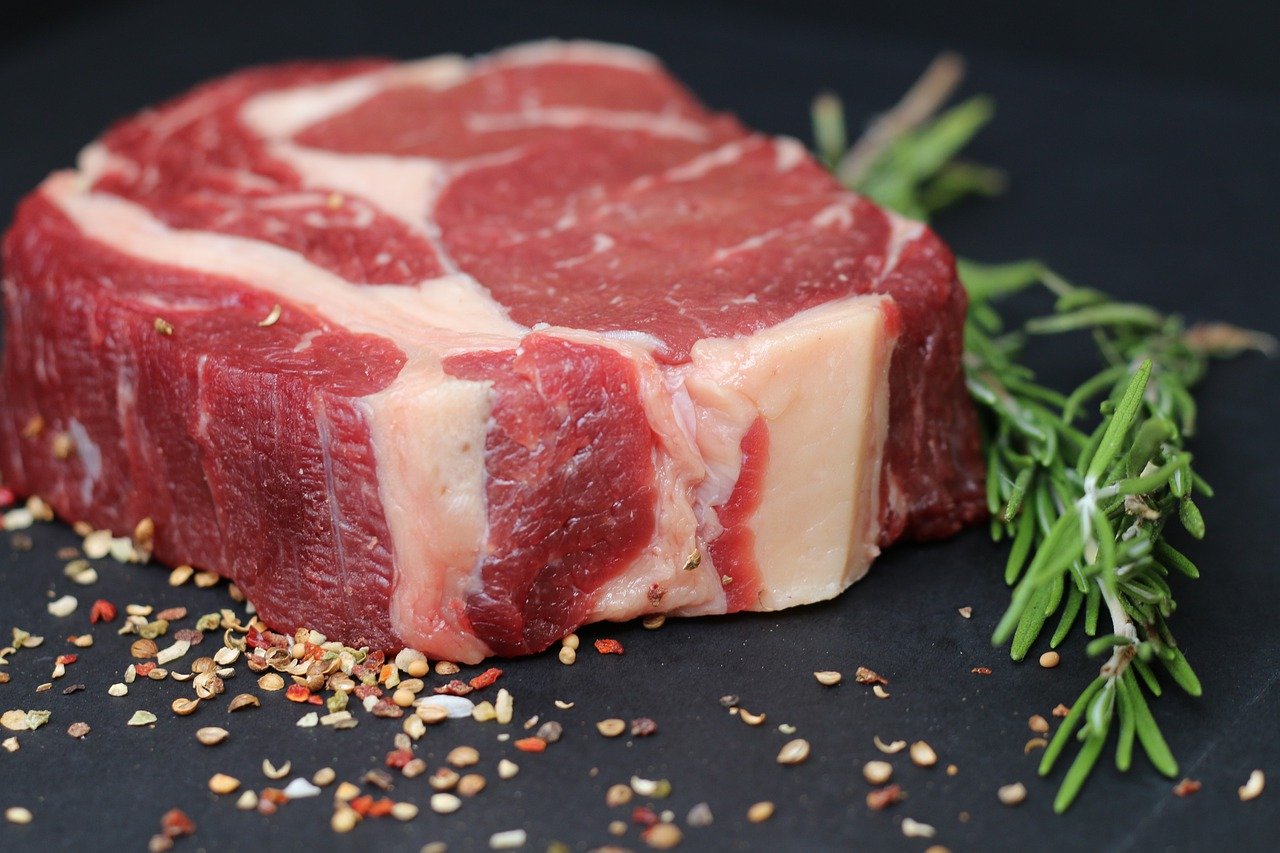
Let’s Talk about How Bad Meat May Be Good
If you’ve paid attention to my writing over the past few years you’ve likely heard me say one thing over and over again.
If you’re going to eat eggs, fish, red meat, pork… the best way to consume these products is to make sure they are from pasture-raised animals (or wild-caught fish).
Why do I say this?
Two reasons.
The first has to do with ethical reasons.
There’s no doubt that factory farming has produced some abhorrent conditions for animals to live in. Here in North Carolina, where we produce millions of tons of chicken and pork, the husbandry practices of commercials farms have come under the microscope and many farms have been shown to treat animals in ways that make me shudder.
Now, I’m not blaming the farmers for how they treat the animals. If anything, the fault lies with the corporations who buy the pork and chicken from the farmers. They’ve essentially locked them into a kind of prison that they can’t get out of and they run these farms the way they do just to keep food on the table. The corporations are mostly concerned with the bottom line.
I’ll talk more about how we find our way out of this quagmire after I blow your mind with the next tidbit.
The second reason I’ve recommended pasture-raised (or wild-caught) is that I believe them to be nutritionally superior.
And I still hold this to be true.
However, I am confronted with some new research that shows that conventionally raised beef may be just about as good for you from a nutritional standpoint as pasture-raised.
And for that reason, I think it worth noting that if you’ve ever avoided eating red meat because of the price of pasture-raised beef, and have gone with an inferior food product when you knew you wanted that steak, or that burger, you can relax a little and buy the beef that’s 60% cheaper than the pasture-raised variety.
Is pasture-raised still better?
Without a doubt!
But, seeing as how red meat is one of the most nutritionally valuable foods on the planet and seeing as how prices everywhere are going up and up, I’m relying on some research done by Robb Wollf, and Diana Rodgers RD to show you that the risk of not eating conventional beef because its “not as healthy” is greater than the risk of eating it (as I believe protein and animal fat are vital for human flourishing).
Why Conventional Meat Isn’t Nearly As Bad as We Thought
So again, I can’t say this enough, pasture-raised beef is the preferred source of meat because it both encourages environmental restoration (through regenerative farming), as well as encourages better treatment of animals.
Both of which are insanely important to support for the future of humanity.
However, conventional beef is just right behind it in terms of nutritional value.
If a grass-fed steak is a 10 for nutrition, then a conventionally raised steak is a 9, or a 9.5
If you find yourself balking at this suggestion let me show you how the data I’ve come across (or that Robb and Diana came across) allows one to come to this conclusion.
The Fats
One of the reasons that I used to harp on conventional beef is because I knew that it didn’t possess the superior ratio of Omega-6 to Omega-3 fats.
And while conventional cows are higher in omega 6’s there are two factors at play that invalidate this as a health concern.
The first is the fact that 2.2 pounds of beef only provides 3.2 grams of omega-6 fatty acids. You can get that same amount of omega-6s from an ounce of walnuts. So, it goes without saying, it’s going to be difficult to consume too much red meat if you’re worried about overloading your omega-6 circuits. And when it comes to omega-3s, 2.2 pounds of beef is only going to give you 70 mg of the stuff. Grass-fed is roughly double… but that’s really not that much, especially when you consider that 3-6 grams of salmon will give you roughly the same amount.
Meaning you’d be better off eating salmon if you want to get omega-3s… and eating a lot of beef isn’t going to overwhelm your body with inflammatory omega-6s.
Still, grass-fed is better as it is more in line with the vaunted 1:1 ratio, but again, fish is really what you want for omega-3s.
What’s more important (in my opinion) is building your diet on foods that will help you consume far fewer omega-6 fats overall. The average American’s diet is ratioed 20:1 and that is because they eat very little fish, and the rest of their diet consists of adulterated vegetable oils and seeds, and nuts.
The bottom line is if you eat more conventional (or grass-fed) beef you’d be getting the protective benefits of protein without exposing yourself to damaging omega-6 fats.
Antibiotics
One of the chief concerns people have regarding conventional beef is that they’re going to get antibiotic remnants in their food.
As Wollf and Rodgers point out this is not likely to happen.
For one thing, the “antibiotic-free” label isn’t something the USDA recognizes or approves, so you don’t know if this is true or not of your beef.
However, the big thing here is antibiotics are no longer used for promoting growth in cattle (as of 2017)… and in the event, they do use them (for sick animals) they’re tested to ensure that the antibiotics have cleared the animal's system before they’re processed.
In general, the livestock industry does not use near the amount of antibiotics they used to, and, in the U.S. all samples of what a slaughterhouse has produced are tested to ensure it’s not contaminated.
Now does that mean it’s impossible to get antibiotic-laced beef from conventional livestock? No. In fact, the best way for this to happen is to buy beef from imported cattle as their restrictions around antibiotic use are lower.
It does bear repeating though that pasture-raised animals are subjected to little antibiotics (much smaller than conventional beef) but you don’t need to worry much about antibiotics tainting your beef. And certainly not nearly as much as in years past.
RoundUp® (Glyphosate)
One of the more interesting things that Wollf and Rodgers found was that conventional and pasture-raised cattle both had negligible amounts of glyphosate (the actual chemical in RoundUp®) in their fat.
There’s long been a fear that because cattle raised on conventional farms aren’t subjected to the same kind of strict husbandry guidelines that pasture-raised animals are, the toxin would store in their far if they happened to eat it regularly.
Whether or not a cow eats feed with glyphosate on it or not, post mortem examination discovered that conventional and pasture-raised animals have such an inconsequentially low amount in their fat that it’s unconcerning.
Of course, it would be better to buy beef from farmers who refuse to touch the stuff to their crops, but it’s a relief to show that you don’t have to worry about this toxin showing up in your burger even if it happened to be exposed to it at some point in the past.
Protein
Several weeks ago I wrote an article on how the more we learn about protein and its role in the diet, the more we begin to realize that it is one of the most important macronutrients for us as a species.
And the good news is that conventional beef is only slightly lower in protein concentrations than pasture-raised.
Why again is protein good for us you might wonder?
Let me give you a brief summary:
- It helps promote lean body mass
- Protein curbs hunger pangs (cravings)
- It can stop the spread of cancer
- It helps to form the basis of many hormones
And more.
Ideally, you would consume a gram of protein for every pound you weigh, and one of the best places to get that much protein in a small size is red meat. It’s one of the best forms of protein and when you eat red meat (conventional and grass-fed) you are also pulling in all kinds of other nutrients many foods are lacking.
Again, conventional beef is just a teensy bit less proteinaceous than pasture-raised and is 40-60% less cost-wise. So, I think it a justifiable reason to give it a nice big green checkmark for the average person
Price
The last reason to go conventional some of the time (or all of the time if you must) is price.
You just can’t get away from it, conventional beef is far cheaper.
And while I think it’s better for society to go pasture-fed, let’s be real, that cost isn’t something that everyone can shoulder.
So there is definitely a case to be made that if a person wants to be healthier and price is an obstacle for eating red meat, then going conventional is the right choice.
I reason that if the difference between a person being healthy or sick is the consumption of more red meat and the price of pasture-raised puts it out of reach, its wise to eat conventional beef
Sure, the ramifications for the environment and the animal are still there, but simply knowing about the dangers of conventional farming raises awareness so that if and when a person can afford pasture-raised meat they will make a decision for the better beef.



